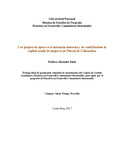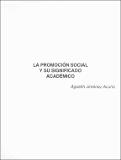| dc.contributor.advisor | Soto Kiewit, Luis Diego | |
| dc.contributor.author | Salas Arburola, José Pablo | |
| dc.date.accessioned | 2023-08-24T21:32:15Z | |
| dc.date.available | 2023-08-24T21:32:15Z | |
| dc.date.issued | 2023-08-09 | |
| dc.identifier.uri | http://hdl.handle.net/11056/26210 | |
| dc.description.abstract | Esta tesis tiene como objeto de estudio, la construcción de la identidad social, a partir
de la politización de la sexualidad de los activistas homosexuales, de edades entre 18 y 35
años de La Asociación Ciudadana ACCEDER, en el primer período del 2022.
La sociología como disciplina, permite el estudio de fenómenos complejos por medio
de la segregación, es decir, categoriza los fenómenos sociales en estructuras, instituciones
sociales, como por ejemplo en dialécticas de poder, entre otras, para luego agruparlos y
entenderlos como totalidad social. Al investigarse la identidad social de los activistas
homosexuales desde la sociología permite una nueva línea de investigación, enfocada en el
análisis de la identidad social desde la politización de la sexualidad.
Entendiéndose la politización como una nueva línea de investigación, que surge por
un cuestionamiento epistemológico y ontológico sobre cómo abordar una investigación
nueva, que une tres grandes campos de estudio: la construcción de la identidad social,
activistas homosexuales y politización de la sexualidad; si bien existe información de todos
estos campos no se investigan y comprenden en conjunto. Siendo esta novedosa porque
irrumpe con la forma tradicional de investigar la homosexualidad que basa sus aportes en la
discriminación, segregación y derechos humanos desde disciplinas como: la psicología,
antropología y sociología.
Esta forma de hacer lectura de este fenómeno social solo desde la discriminación y
segregación de los derechos humanos, invisibliza la lógica de la existencia de identidades
homosexuales en un sistema civilizatorio heteronormado. Pues solo explica las
consecuencias de la estructura social y cultural, pero no la lógica detrás de la existencia de la
homosexualidad posicionando al sujeto como creador de su identidad, invisibilizando que
éste a su vez, es reproductor de identidades, por ende, negando las tensiones sociales que
sufren los sujetos al auto identificarse en la estructura de homosexual. Asimismo, esta lógica
niega la influencia de lo político en los sujetos al auto identificarse, para que se les reconozca
socialmente y el impacto que tiene esta sobre cómo van a visualizar la realidad.
Por lo tanto, esta propuesta problematiza la identidad social homosexualidad como
una identidad que tiene una lógica estructurada, la cual al igual que la heterosexualidad tiene
imaginarios, discursos, es dinámica, sensible, actuante, perceptible y presentable
socialmente, por lo cual puede analizarse desde la politización.
Para efectos de esta investigación, la politización en tanto categoría de análisis se va
a comprender, como un proceso dinámico de tensiones, donde el sujeto se construye a sí
mismo, a los demás y a su entorno. Esta politización se lleva a cabo a través de cuatro fases:
la politización de la vida, la politización de la sexualidad, la politización del sujeto y la
identidad social, las cuales se explican a lo largo del documento. Los hallazgos encontrados
en las teorías y su relación para estudiar la identidad social de los homosexuales dan como
resultado una nueva línea de investigación sociológica.
En el marco de esta investigación, se concibe la identidad social homosexual como el
proceso de auto-identificación de los sujetos, el cual les da significado a ellos, del entorno y
de cómo van a ser percibidos socialmente y la percepción que tiene la sociedad de ellos, lo
cual es cambiante según la cultura, estatus económico, edad, y aspectos políticos y religiosos.
Además, la orientación sexual se piensa desde la atracción que tenga el sujeto, físico,
emocional y afectivo, hacia un sexo o sexos.
Si bien se ha estudiado la militancia política como la pertenencia de los sujetos a
movimientos políticos, sociales y culturales (Butler, 1999). Para efectos de la identidad, la
militancia política se va a entender como la forma en que los sujetos se representan bajo una
o varias identidades en su cotidianidad, que les marca como ver la realidad y como van a ser
reconocidos socialmente, producto de vivir en un sistema civilizatorio que politiza la
sexualidad (Butler, 1999).
En suma, esta propuesta no solo aporta una nueva aproximación al estudio de las
identidades, sino también crea y llena de nuevos significados a conceptos ya existentes en el
estudio de este fenómeno social. | es_ES |
| dc.description.abstract | This thesis has as object of study, the construction of social identity, from
of the politicization of the sexuality of homosexual activists, aged between 18 and 35
years of the ACCEDER Citizen Association, in the first period of 2022.
Sociology as a discipline allows the study of complex phenomena through
of segregation, that is, it categorizes social phenomena into structures, institutions
social, as for example in dialectics of power, among others, to later group them and
understand them as a social whole. When investigating the social identity of the activists
homosexuals from sociology allows a new line of research, focused on the
analysis of social identity from the politicization of sexuality.
Understanding politicization as a new line of research, which arises from
an epistemological and ontological questioning on how to approach an investigation
new, which unites three large fields of study: the construction of social identity,
homosexual activists and the politicization of sexuality; although there is information on all
these fields are not researched and understood together. Being this new because
breaks with the traditional way of investigating homosexuality that bases its contributions on the
discrimination, segregation and human rights from disciplines such as: psychology,
anthropology and sociology.
This way of reading this social phenomenon only from discrimination and
segregation of human rights, makes invisible the logic of the existence of identities
Homosexuals in a heteronormative civilizational system. Well, it only explains the
consequences of the social and cultural structure, but not the logic behind the existence of the
homosexuality positioning the subject as creator of his identity, making invisible that
this, in turn, reproduces identities, therefore, denying the social tensions that
the subjects suffer when self-identifying in the homosexual structure. Also, this logic
denies the influence of the political in the subjects to self-identify, so that they are recognized
socially and the impact that this has on how they will visualize reality. Therefore, this proposal problematizes the social identity homosexuality as
an identity that has a structured logic, which, like heterosexuality, has
imaginary, speeches, is dynamic, sensitive, acting, perceptible and presentable
socially, for which it can be analyzed from politicization.
For the purposes of this research, politicization as a category of analysis will be
to understand, as a dynamic process of tensions, where the subject constructs himself
yourself, others and your environment. This politicization is carried out through four phases:
the politicization of life, the politicization of sexuality, the politicization of the subject and the
social identity, which are explained throughout the document. The findings found
in the theories and their relationship to study the social identity of homosexuals give as
A new line of sociological inquiry has resulted.
Within the framework of this research, the homosexual social identity is conceived as the
process of self-identification of the subjects, which gives meaning to them, the environment and
of how they will be perceived socially and the perception that society has of them, what
which is changing according to culture, economic status, age, and political and religious aspects.
In addition, sexual orientation is thought from the attraction that the subject has, physical,
emotional and affective, towards a sex or sexes.
Although political militancy has been studied as the belonging of the subjects to
political, social and cultural movements (Butler, 1999). For identity purposes, the
Political militancy will be understood as the way in which subjects represent themselves under a
or several identities in their daily life, which marks how they see reality and how they are going to be
socially recognized, product of living in a civilizational system that politicizes
sexuality (Butler, 1999).
In short, this proposal not only provides a new approach to the study of the
identities, but also creates and fills with new meanings to already existing concepts in the
study of this social phenomenon. | es_ES |
| dc.description.sponsorship | Universidad Nacional, Costa Rica | es_ES |
| dc.language.iso | spa | es_ES |
| dc.publisher | Universidad Nacional, Costa Rica | es_ES |
| dc.rights | Acceso abierto | es_ES |
| dc.subject | PARTICIPACIÓN SOCIAL | es_ES |
| dc.subject | SOCIAL PARTICIPATION | es_ES |
| dc.subject | INTERACCIÓN SOCIAL | es_ES |
| dc.subject | SOCIAL INTERACTION | es_ES |
| dc.subject | SEXUALIDAD | es_ES |
| dc.subject | SEXUALITY | es_ES |
| dc.subject | HOMOSEXUALIDAD | es_ES |
| dc.subject | HOMOSEXUALITY | es_ES |
| dc.subject | POLÍTICA | es_ES |
| dc.subject | POLICY | es_ES |
| dc.title | La construcción de la identidad social en los activistas homosexuales, a partir de la politización de la sexualidad Caso: Activistas militantes de Asociación Ciudadana ACCEDER | es_ES |
| dc.type | http://purl.org/coar/resource_type/c_7a1f | es_ES |
| dc.description.procedence | Escuela de Sociología | es_ES |


